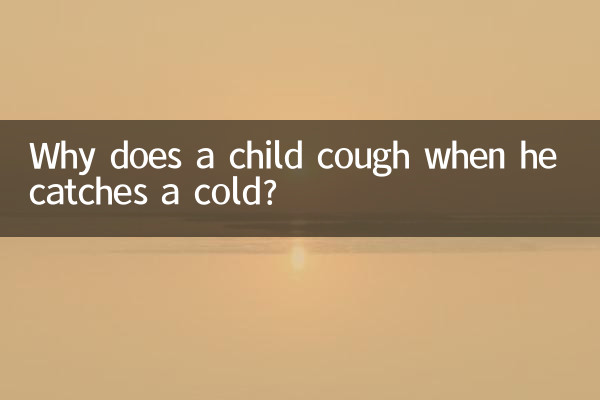Why does a child cough when he catches a cold?
Recently, many parents have reported on social media and parenting forums that their children can easily develop coughs when they catch a cold, which can even last for a long time. This issue has triggered extensive discussions. The following is an analysis and suggestions based on the hot topics and hot content on the entire network in the past 10 days.
1. Why do children cough easily after catching a cold?

Coughing after a cold is a common symptom in children. The main causes include:
| Reason | Description |
|---|---|
| respiratory tract sensitivity | Children's respiratory tract is relatively fragile, and cold viruses can easily trigger an inflammatory reaction and cause coughing. |
| Rhinorrhoea | When you have a cold, nasal secretions increase and flow back into the throat to stimulate coughing. |
| airway hyperresponsiveness | Some children have airway hyperresponsiveness and are prone to persistent cough after catching a cold. |
| secondary infection | Colds may cause secondary infections such as bronchitis, making coughs worse |
2. Recent hot issues that parents are concerned about
According to the analysis of online discussion data in the past 10 days, parents are most concerned about the following issues:
| focus | Discussion popularity | Typical questions |
|---|---|---|
| cough duration | high fever | "My child has been coughing for two weeks after recovering from a cold. Is it normal?" |
| Cough gets worse at night | Middle to high | "Why doesn't my child cough much during the day but coughs badly at night?" |
| Cough remedies | high fever | "What safe and effective methods do you recommend for cough relief?" |
| Are antibiotics needed? | in | "Does my child need antibiotics for coughing?" |
3. Expert advice and home care methods
Regarding the problem of cough in children after catching a cold, experts give the following suggestions:
1.Differentiate cough types: Different cough types such as dry cough, wet cough, and night cough may indicate different problems, and cough characteristics should be observed and recorded.
2.Keep the air moist: Use a humidifier or bathroom steam to relieve respiratory tract irritation. It is advisable to keep the humidity at 40%-60%.
3.Appropriate amount of hydration: Warm water and honey water (over 1 year old) can relieve throat discomfort, but avoid excessive drinking.
4.Use medication with caution:
| drug type | Applicable situations | Things to note |
|---|---|---|
| cough medicine | Dry cough seriously affects sleep | Use with caution in children under 6 years old |
| expectorant | Excessive phlegm that is difficult to cough up | Combined with back patting to help eliminate phlegm |
| antibiotics | bacterial infection | Use only after evaluation by a doctor |
4. When do you need medical treatment?
You should seek medical treatment promptly if the following situations occur:
- Cough that persists for more than 2 weeks without significant improvement
- Accompanied by high fever (body temperature exceeding 38.5°C for 3 days)
- Shortness of breath, labored breathing, or wheezing
- Turning blue or having blue lips when coughing
- General symptoms such as food refusal and listlessness
5. Preventive measures
1.Enhance immunity: Ensure adequate sleep, balanced nutrition, and moderate exercise
2.Reduce chances of infection: Wash your hands frequently, avoid contact with people with colds, and get vaccinated before flu season
3.Keep the environment clean: Ventilate regularly and avoid respiratory tract irritation such as second-hand smoke
In short, coughing is a common phenomenon in children after catching a cold, and in most cases it will get better as the cold recovers. Parents do not need to be overly anxious, but they need to closely observe changes in symptoms and seek medical treatment promptly when necessary. Through scientific care and prevention, children can be helped to reduce the frequency and severity of colds and coughs.

check the details

check the details